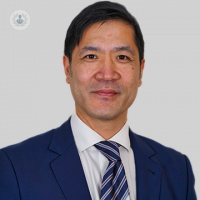Precancerous lesions of the gullet (oesophagus): diagnosis and treatment
Written in association with:Barrett's oesophagus is the most common precancerous condition found in the oesophagus. It often causes precancerous lesions of the gullet.

We recently spoke to leading Essex-based consultant general surgeon, Mr Cheuk Bong Tang, to find out about lesions of the gullet, how dangerous they are and how they can be treated.
What are precancerous lesions of the gullet (oesophagus)?
These are lesions that are asymptomatic and they are normally found incidentally while being investigated for other reasons i.e. when suffering from acid reflux, in which an OGD is performed.
These lesions are usually found in areas of Barrett’s oesophagus. Barrett’s is where the gullet lining cells have changed to resemble stomach lining cells; the better to protect themselves form the acid. This is not cancer as the cell types are mature.
How dangerous are precancerous lesions of the gullet (oesophagus)?
We know precancerous lesions of the gullet, found in areas of Barrett’s oesophagus, can predispose you to developing cancer (the risk is increased in the order of 40-80 times the general population), although the overall risk remains low. If Barrett’s is found, you will be entered into a regular OGD surveillance program (2-3 yearly), and these cells examined for any worrying changes. You will also be prescribed an anti-acid as this may delay or reverse these changes.
In this situation, cancer does not usually develop overnight, but the cells go through a stepwise progression in which they become increasingly immature or disoganised. This is known as dysplasia of which there are 2 types, ‘high’ and ‘low’.
What are symptoms of precancerous or early cancerous lesions?
As these lesions are early, they are usually asymptomatic, or you may experience regular heartburn (GORD/GERD), as it is the damage caused by stomach acid that stimulates these changes. An OGD would be a wise precaution if you have severe heartburn; symptoms that are not adequately treated with either anti-acids or dietary modification; a family history of either stomach or gullet cancer.
How can they be treated?
If the cells are not cancerous, then you will be offered HALO which will burn (ablate) these cells and enable the gullet to heal by producing the normal gullet cells. HALO consists of a specialised endoscope attachment, performed as a day procedure either under a GA or sedation. 3 or more sessions are required to fully treat the dysplastic cells over the course of 1 year and you will remain on an anti-acid.
How do you prepare for HALO treatment?
As the above procedures are performed as day cases, endoscopically, then the preparation is as for a normal OGD and you will be contacted by the endoscopy nurses to discuss whether you need to temporarily change or stop your present medication. However, if a GA is required then the normal anaesthetic preadmission will be followed, which may necessitate a visit to the hospital for assessment.
For more information about screening for lesions of the gullet or upper GI surgery, you may like to book an appointment with a leading consultant general surgeon such as Mr Cheuk Bong Tang. Visit his profile today for more details.



